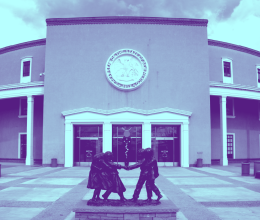Things are just starting to get ridiculous.
Many of you no doubt read about the Region III Narcotics Task Force heroic raid on the Camino de Paz Montessori School and Farm in Cuarteles, NM where officers in bullet-proof vests without visible insignia demanded to inspect their green house, expecting to find a marijuana grow operation. They didn't find Marijuana. What they did find...was organic tomatoes.
Although I'll be the first to admit that home-grown tomatoes taste so good they ought be a crime, I find it downright disturbing that our local Narcotics Task Force is operating with such sloppiness that they subjected grade-school children to the high-drama of a narcotics raid, complete with National Guard helicopter.
From the Santa Fe New Mexican:
We were all as a group eating outside as we usually do, and this unmarked drab-green helicopter kept flying over and dropping lower," she [Patricia Pantano, education director] said. "Of course, the kids got all excited. They were telling me that they could see gun barrels outside the helicopter. I was telling them they were exaggerating."Law enforcement throughout the state has become increasingly aggressive in their search for illegal marijuana grow operations lately. The ACLU has received complaints from people in Madrid who say helicopters have been buzzing their homes incessantly, low and loud, looking to bust the various small-time grow operations that dot rural NM.
After 15 minutes, Pantano said, the helicopter left, then five minutes later a state police officer parked a van in the school's driveway. Pantano said she asked the officer what was happening, but he only would say he was there as a law-enforcement representative.
Then other vehicles arrived and four men wearing bullet-proof vests, but without any visible insignias or uniforms, got out and said they wanted to inspect the school's greenhouses. Pantano said she then turned the men over to the farm director, Greg Nussbaum.
"As we have nothing to hide, you know, they did the tour and they went in the greenhouses and they found it was tomato plants and so that was the story," she said.
Read the full story
These sorts of tactics should raise the hackles of any privacy or civil liberties-minded person. If a Montessori school is subject to narcotics raids, who isn't? Should gardeners everywhere resign themselves to periodic investigations of their backyard gardens by the National Guard and narcotics officers? Perhaps one could make an argument that this is the price we pay for having a safe, drug-free society...if that's indeed what we had. In fact, the Drug Policy Alliance says it's had the opposite effect:
Many of the problems the drug war purports to resolve are in fact caused by the drug war itself. So-called “drug-related” crime is a direct result of drug prohibition's distortion of immutable laws of supply and demand. Public health problems like HIV and Hepatitis C are all exacerbated by zero tolerance laws that restrict access to clean needles. The drug war is not the promoter of family values that some would have us believe. Children of inmates are at risk of educational failure, joblessness, addiction and delinquency. Drug abuse is bad, but the drug war is worse.With deep budget cuts already in place and state employees on furlough, how can New Mexico afford to continue funding this drug war--a war that is disastrous for our civil liberties and the health of our communities?
Few public policies have compromised public health and undermined our fundamental civil liberties for so long and to such a degree as the war on drugs. The United States is now the world's largest jailer, imprisoning nearly half a million people for drug offenses alone. That's more people than Western Europe, with a bigger population, incarcerates for all offenses. Roughly 1.5 million people are arrested each year for drug law violations - 40% of them just for marijuana possession. People suffering from cancer, AIDS and other debilitating illnesses are regularly denied access to their medicine or even arrested and prosecuted for using medical marijuana.
We've tried prohibition, once with alcohol and then again with drugs. It's been an utter failure by any standard. It's time to try something else.
- Micah McCoy, Communications Specialist
For more information on the ACLU's work to change U.S. drug policy, visit the National ACLU's Drug Law Reform page.





